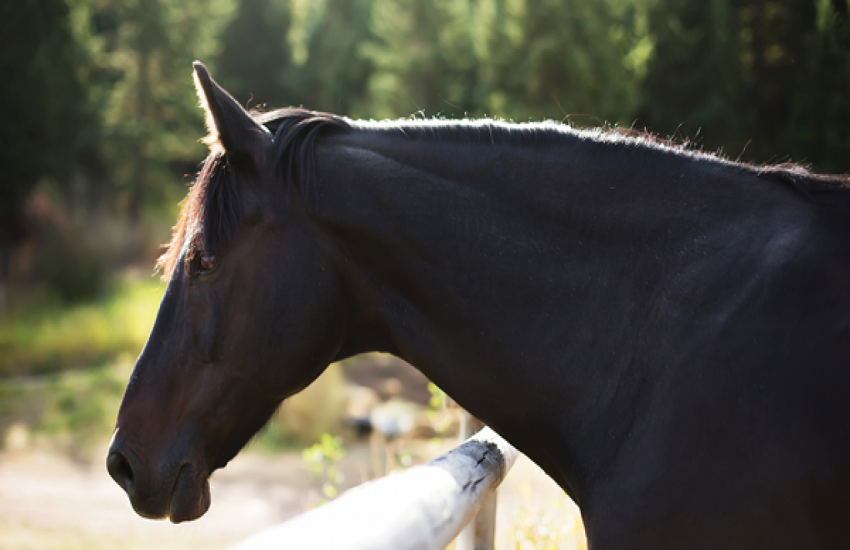Welcome back, today I would like to explain how we have continued to move forward in the workplace with horses to date, which has been completely ignored; and that area is the control of emotional stress on horses.
You may seen many cartoons that shows horse talking on the cartoon networks like cartoon crazy and others. Let us discuss about this main topic today brain of horses.
Starting with horses don’t think the same way we do; their brains are arranged in a completely different way, and how your horse uses their brain and your input becomes the cause of the various levels of stress your horse may experience.
When we look at and compare the horse’s brain with ours, the most important area we should consider is the location of the “front lobe”.
In our brain the frontal lobe is extremely large and well developed, because this is the part of our brain that allows us to process all the information we receive daily and add to our personality, as well as our ability to develop cognitive, or thinking skills.
The opposite is true for your horse when we compare the same area the front layer of your horse’s brain is not very developed so it does not give them anything close to the ability to think about a problem close to the skill you or I have.
Parts Of Horse Brain
Most of the other parts of your horse’s brain that provide movement and general sports have improved in the way our frontal brain has.
If you put your horse in a position where they need to think about how they got out of it you will probably end up with a horse full of airplane mode which will lead to your horse releasing it so that it can defend itself. Not to mention high levels of stress can be created within this situation.
In that case you might wonder how all of this comes together and how it works together; it is accomplished by one very small part of the horse’s brain. In fact, the area I am talking about is about the size and shape of almonds. That part of the brain is called the “Amygdala” which is closely related to your horse’s emotional control area, which is directly related to your horse’s emotional stress.
The emotions described here, in view of the horse’s brain, are based on fear and anger; this feeling is not a feeling of sorrow, pride, or some other factor we may encounter. It is a place of what is known as antiquity in nature and nature in the way we react when it is renewed; this is where the answer to “fight or flight” comes from.
The first part of the horse’s brain that includes the Amygdala is part of the “limbic system” and it is this brain system that leads to many of your horse’s unresolved problems and how these same problems are often maintained.
All things that have touched them in the past, those that they did not understand or relate to are stored here and can be brought forward from time to time.
The significance of this place is that it is one of the foremost and controlling areas for the production of emotional stress and it is this same pressure that exudes fear and panic produces a “plane or fight” response; therefore being able to communicate with a real problem helps both understand the root of the problem and give us a way to follow it that will help end the problem created by their emotional response.
It is the size, development, and way your horse uses their front lobe that leads to the various levels of stress that can be created within any given situation.
Your Horse Depressed?
Depression is a condition that occurs in your horse’s body and if left untreated can cause chronic problems.
As in humans, when a horse is pressed, the hormone “cortisol” is released; this hormone is often referred to as the “stress hormone” produced by the adrenal glands and resides in the blood and saliva of your horse creatures with mermaid names.
There is a belief among some trainers that something used with a horse helps relieve stress and allow the horse to better cope with the situation in which they work. This group refers to the use of “Sweet Water” to achieve this effect. Explaining, a small amount of sweet water with an unmistakable iron of the main substance, (the part that enters the mouth), has been shown that untreated iron allows the horse to make more saliva, thus allowing the release of the hormone cortisol and the horse to have greater calm in stressful situations.
The hormone cortisol is taken up by various cells throughout your horse’s body and is often used appropriately to regulate your horse’s metabolism, electrolyte balance, and help reduce any inflammation.
Although cortisol is very important to help control your horse’s overall health, it sometimes becomes unbalanced and that is what leads to health issues.
Cortisol Of Horse
When a horse has high levels of cortisol it actually weakens the horse’s natural immune system, the immune system, making it more susceptible to many problems from bacterial infections, such as; thrush, abscesses or even rain rot.
It has been our experience that when a great deal of emotional stress has been released we see more physical problems emerge; such as disability problems, physical anxiety, mobility problems, and many other conditions. We tend to believe that this is the body’s way of allowing the immune system to function at a higher rate than before.
There are basically two levels of stress that appear in horses and these are; Long-term stress, called Chronic Stress and short-term stress called Acute stress.
Understanding the differences between the two will help you manage your horse’s stress.
To help you understand the difference between the two types of stress, I will include some of the indicators of both Acute Stress and Chronic Stress, namely:
Signs of Critical Pressure
- Shivering
- Tight Muscles
- Beating
- Binding
- Top Cart / Head Carriage
- Tail Wars
- Spacing
Indications for Chronic Stress
- Stall Walking or Weaving
- Changing Your Horse Vision
- Type of Violent Behavior
- Stomach ulcers
- Grinding of Teeth
- Skin Diseases
- Colic
- Black Coat
- Decreased performance
Conclusion
Now, these are just some of the many indications of acute and chronic stress levels; every horse is different and every horse responds differently to the same situation.
Here’s where it’s important to know what’s common with your horse and what’s unusual.
Just as people have experienced symptoms of stress, horses will do the same and this can be very annoying for horse owners who suddenly have to deal with their horse’s seemingly sudden health problems.
The area of emotional stress management we have entered is very young and we have made great progress with many different horses in many different situations.
In a campaign to help the horses, their owners, and to bring the horses back to a level of performance that seemed to go down the road we opened the door to many past problems that seemed unattainable in the past.
If you have a horse that you feel could benefit from our services, please contact us and we would greatly appreciate the opportunity to talk to you about your horse and decide how we will be able to help you and your horse.
Yes, that’s about integrating what we wanted to convey today and it’s always open to you with your feedback and ready to accept your ideas; so please do so!
Read more stories on healthyslife



